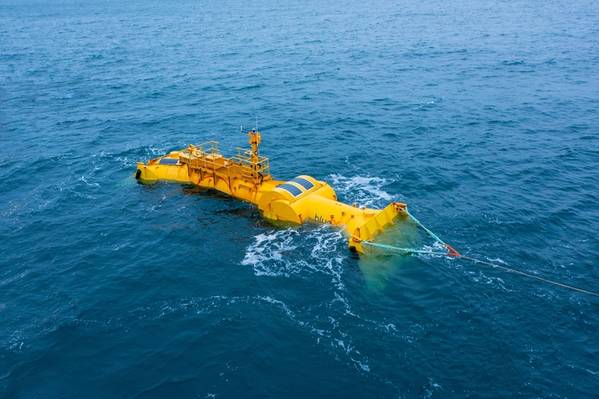
A project to power subsea equipment with wave power and subsea energy storage has taken to the seas in the north of Scotland.
The £2 million demonstrator project, called Renewables for Subsea Power (RSP), has connected Mocean Energy's Blue X wave energy converter – Verlume's Halo underwater battery.
The two technologies have been deployed in the seas off Orkney and have now begun a minimum four-month test program where they will provide low carbon power and communication to infrastructure including Baker Hughes’ subsea controls equipment and a resident underwater autonomous vehicle provided by Transmark Subsea.
The European Marine Energy Centre (EMEC) has supplied instrumentation to measure the speed and direction of currents during the deployment, while Wave Energy Scotland has provided £160,000 to support the integration of the umbilical into the wave energy converter.
The project aims to show how green technologies can be combined to provide reliable low carbon power and communications to subsea equipment, offering a cost-effective alternative to umbilical cables, which are carbon intensive with long lead times to procure and install.
The Orkney deployment is the third phase of the Renewables for Subsea Power project which is being supported by consortium partners which include UK-based energy companies Harbour Energy and Serica Energy. Each phase of the program has also been supported by grant funding from the Net Zero Technology Centre (NZTC).
According to a press release issued Monday, Verlume’s seabed battery energy storage system, Halo, has been specifically designed for the harsh underwater environment, reducing operational emissions and facilitating the use of renewable energy by providing a reliable, uninterrupted power supply. Halo’s fundamental basis is its intelligent energy management system, Axonn, a fully integrated system which autonomously maximises available battery capacity in real time.
The RSP Halo system is the second variant that has been built for commercial wave power integration and the first to be built at Verlume’s 20,000 square foot facility in Dyce, Aberdeen.
Alex Seinuah, Baker Hughes Growth Hub Leader said: “The integrated deployment of our renewable subsea power solution in Orkney is a historic moment for all partners involved. Baker Hughes looks forward to sharing the outcome of the offshore deployment with its customers, who are looking at field electrification via renewable sources.”
“This is a fantastic opportunity to further test our resident autonomous underwater drone in an open sea environment” says Nigel Money, managing director Transmark Subsea Ltd. “We currently run the system in salmon farming nets, which is a more closed environment. Mocean and Verlume's solution fits very well with our product and allows us to demonstrate broader operational capabilities of an off-grid resident AUV. Our dock and drone is designed to be easily deployed anywhere and the RSP project is a great demonstrator of this capability.”